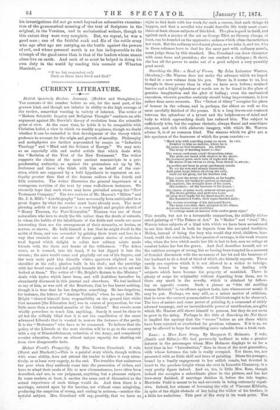Searching the Net : a Book of Verses. By John
Leicester Warren. (Strahan.)—Mr. Warren does not make the advance which we hoped to find in a new volume from his pen. There is, it seems to us, less thought in these poems than in what we have seen before ; strained fancies and a frigid splendour of words -are to be found in the place of genuine imagination and the glow of feeling; even the mechanical execution, wherein practice certainly should bring improvement, is less rather than more accurate. The "Defeat of Glory" occupies the place of honour in the volume, and is, perhaps, the ablest as well as the most carefully finished of the poems. It is a long drawn-out contrast between the splendour of a tyrant and the helplessness of mind and body to which approaching death has reduced him. The subject is sufficiently trite, but the copious rhetoric, always fluent' and sometimes eloquent, and rich with elaborate imagery, with which Mr. Warren adorns it, is of no common kind. The stanzas which we give are a fair specimen of the fourscore of which the poem consists :— " Mock him with sounding pomp no more. In vain.
Number to him no nations, where he is By name as God incarnate. Ah, refrain The irony of bending knees to this!
The weary sunbeams crawl themselves away.
The walls are laced with shadow in the moon.
He is almost gone, each turn of night and day, He wanes from swoon to sleep, from dream to swoon ; As scribes are busy in great parchment scrolls
To set his acts and annals chronicled ; And paint large letters all along the rolls,
Gold for his glory, for his warfare red.
They count the array of chariots, as he fought, His wives, his tankards carious at carouse ; His captives, the wrought lions of his court, His archers ; all the increase of his house, •
His chests of sewn work, armour arrow-proof,
His dasclal girdles, and unwoven bales Of crisp wool ready for his hand-maid's woof.
His hammered bowls, their topaz-headed nails ; The woven strewIngs of his mirrored floors, The keen root-dust, that, mingled in his wines, Arose an incense over corridors
To ceilings made as heaven with twelve great signs."
This recalls, but not to a favourable comparison, the skilfully elabo- rated painting of "The Palace of Art" In " Medea " and "Jael," Mr. Warren takes subjects of a kind with which we have been accustomed to see him deal, and in both he departs from the accepted tradition.• Medea, instead of being the fury who would slay rival, children, hus- band, 'Could she reach him, in her passion of revenge, is the weak woman who, when the love which made her life is lost to her, sees no refuge or comfort before her but the grave. And Jael describes herself, not as the ruthless avenger of wrong, but as having been tempted in a moment of frenzied discontent with the meanness of her lot and the baseness of her husband to do a deed of blood of which she bitterly repents. These surely are caprices which it is not allowed to a writer to indulge. He is bound to keep within certain lines in dealing with subjects which have become the prop3rty of mankind. Thera is plenty of scope for originality without departing from them, nor is there any merit in the novelty which is obtained by follow- ing an opposite course. Such a phrase as "this old scolding woman Deborah" is an offence against taste, into whosesoever mouth it may be put. Perhaps, we may add, as a minor matter of criticism, that in verse the correct pronunciation of Deborah ought to be observed. The love of nature and some power of painting it, a command of richly adorned language, and no inconsiderable power of versification, are gifts which Mr. Warren still shows himself to possess, but they do not seem to grow in the using. Perhaps in the title of Searching the Net there is implied the apology that the " verses" before us are those which have been rejected or overlooked for previous volumes. If it is so, we may be allowed to hope for something more valuable from a fresh east.


































 Previous page
Previous page